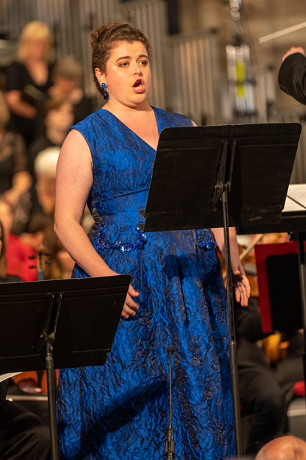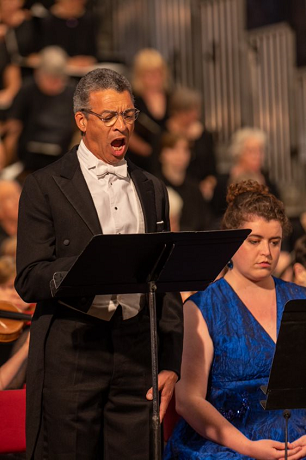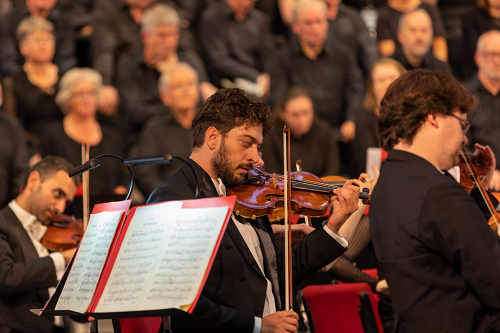The Stabat Mater is a Latin hymn, probably dating from the 13th century, which commemorates and mediates upon the sorrow and grief of the Virgin Mary at the Crucifixion, as she cradles the body of her dead son. Like that of the Magnificat, the text offers a feminine perspective on Jesus’s sacrifice. the imagery and evocation of grief are raw, and yet there are moments too of love, tenderness and hope, and it is through contemplation of Mary’s suffering that we too might be redeemed.
The beauty and dignity of the poem has stimulated the creative imagination of countless composers of distinction. Sir Walter Scott remarked that it was impossible to hear the words of this Latin text (and that of the Dies Irae) ‘without feeling that the stately simplicity of the language, differing almost as widely from classical poetry as from that of modern nations, awes the congregation like the architecture of the Gothic cathedrals in which they are chanted’. Richard Blackford’s Pietà, for mezzo-soprano and baritone soloists chorus, children’s chorus, string orchestra and solo saxophone, as commissioned by the Bournemouth Symphony Chorus and St Albans Choral Society and first performed in June 2019 at The Lighthouse, Poole, the work subsequently won an Ivor Novello Composer Award in 2020 for the Choral Category. It both contributes to the long tradition of musical mourning and approaches the Stabat Mater text in fresh ways.
Blackford introduces a dynamic vigour into his setting of the Latin hymn, expressing an anger which is in part driven by the inclusion of settings of two poems from Anna Akhmatova’s cycle, Requiem. In the manner of Benjamin Britten’s War Requiem, this places Mary’s suffering within a more universal reflection on grief and loss. In addition, the solo soprano saxophone is, in Blackford’s words, a ‘third soloist’, representing ‘the wordless voice of Mary, like an ancient musical shawm in its upper register, but also creating a modern instrumental dimension, very close to the sound of the human voice’. Its plaintive lament enhances the modern perspective through which we view historic suffering but in this performance at the Three Choirs Festival by the Philharmonia Orchestra, Three Choirs Festival Chorus, Choristers of Worcester Cathedral, with soloists Roderick Williams, Jess Dandy and Amy Dickson, conducted by Samuel Hudson, it seemed also to offer an alternative, potentially more hopeful, resolution.

The first of the three parts which form Pietà begins with an expressive string introduction, and here the gentle shudderings in the lower strings seemed to pose troubling questions, firm accents underscoring the word repetitions of the chorus. A dramatic choral interjection, “O quam tristis et afflicta” initiated a crescendo-ing surge towards the final stanza and the choral image of mourning, “Quae moerebat et dolebat”, was a vivid outburst of pain. Jess Dandy sang the intense solo, “Quis est homo, qui non fleret” (Who is the person who would not weep), with impressive poise, her voice focused and direct even when her contralto was pushed high into mezzo-soprano territory. She used the vocal repetitions to introduce a rich array of colours, drawing us into the full depth of Mary’s agony. Amy Dickson’s saxophone wound itself around the words, introducing the motif – a small fall, then arching rise – that serves as a binding force, and voice and instrument conversed with ever more concentration, building to a fury, underpinned by the strings’ pulsing accompaniment, with the portrait of Mary’s anguish, “Dolentum cum filio?”.
Roderick Williams was a characteristically assured baritone soloist, presenting the text so naturally and engagingly, in the following depiction of Mary’s witnessing of her son’s torment as he is savagely scourged for the sins of mankind. The jagged anger was quelled, though, by Williams’s account of Jesus’s death. The baritone’s beautiful, floating pianissimo, “Dum emisit spiritum” (while he gave up his spirit), which ran segue into the choir’s ‘Eia mater, fens amoris!” (O Mother, fount of love) – a delicate but fervent layering of falling voices. Unisons across the choir and orchestra, as the former reiterated the desire to know the love of Christ, “In amando Christum Deum”, created tension and drama, which were interrupted by the entry of the saxophone whose sinking phrase was subsumed within the string tremolando.

Part II introduces the children’s choir and the Choristers of Worcester Cathedral delivered the simple motifs expressively, joined by Dickson’s saxophone which sang with equal purity. Akhmatova’s two poems, in translation, follow. The poet’s husband was taken by Stalin’s KGB and ‘disappeared’, and her son was also arrested; the first poem expresses her fear that she will never see the latter again:
For seventeen months I’ve pleaded,
Pleaded that you come home,
Flung myself at the hangman’s feet
For you, my son,
For you, my horror.
Fuelled by the strings’ urgent pizzicatos and raging tremolandos, Dandy erupted with declamatory intensity. In the second poem, Jesus pleads with his mother to cease weeping for him. Hudson powerfully shaped the choral crescendo which emphasises the import of the “momentous hour” and exploited the harmonic ‘twists’ that inject fierce heat into the image of “all the heavens dissolved/ Into fire”. There was an almost apocalyptic dimension to the deluge of choral sound.
The concluding part of Pietà begins calmly, the female voices of the choir conversing with the saxophone, the latter joined by solo cello. But, there is an injection of tension with the entry of the two solo voices, and here the quiet cadence with which Williams closed the opening section could not dispel the sense of anticipation for the tumult to come. And, come it did: a stormy evocation of The Last Judgement employing the full vocal forces whose vivid cries, “Virgo”, were like lightening strikes cutting through the unison strings’ thundering semiquavers. But, resolution, of a sort, followed. After the soloists’ recitation above a dissonant pedal, the pulse an unrelenting throb, the entry of the soprano saxophone salved the suffering, Dickson’s gentle arcs floating above the choir’s whispered repetitions, “Stabat mater”, the strings sustained and motionless.

Blackford’s resolutely tonal language might not be to everyone’s taste, and there is perhaps little that is ‘innovative’ or ‘individual’ about his writing. But, his handling of large choral forces and his shaping of musical drama, bringing together the religious, the personal and the universal, is impressively accomplished. And, as assuredly as Blackford composes for large choral forces, so Hudson guided those performers through the monumental theological and human dramas, respecting and communicating Pietà’s expressive power.
The conductor seemed less at home in the first part of the evening, however. Webern’s orchestration of the six-voice ricercare from J.S. Bach’s Musical Offering has greater richness that Hudson summoned from the Philharmonia. This account was noble and poised, and the counterpoint was fluid, but the orchestral colours seemed somewhat blanched and there was an absence of the sort of muscularity which would delineate the structure of the work. Strauss’s Metamorphosen for 23 solo strings is a lament for a country, a culture and a civilisation in ruins. One could not fault the commitment and sustained focus of the Philharmonia string players, and Hudson moved smoothly through the transitions between the unfolding variations, but the music seemed to reach a peak of luxuriousness too soon, and I missed the savagery – the grain and grit – of the string lines which communicate such a terrible anguish, an almost unbearable tension. One should be mesmerised by and drawn within an inescapable embrace of melancholy, but this performance felt two-dimensional.
On this occasion, it was not Strauss’s threnody but Blackford’s Pietà which made the most overwhelming impression.
Claire Seymour
Jess Dandy (contralto), Roderick Williams (baritone), Amy Dickson (saxophone), Samuel Hudson (conductor), Philharmonia Orchestra, Three Choirs Festival Chorus, Worcester Cathedral Choristers
J.S. Bach arr. Webern – Ricercare, Strauss – Metamorphosen, Richard Blackford – Pietà
Hereford Cathedral, Hereford; Wednesday 27th July 2022.
All images (c) Dale Hodgetts & James O’Driscoll